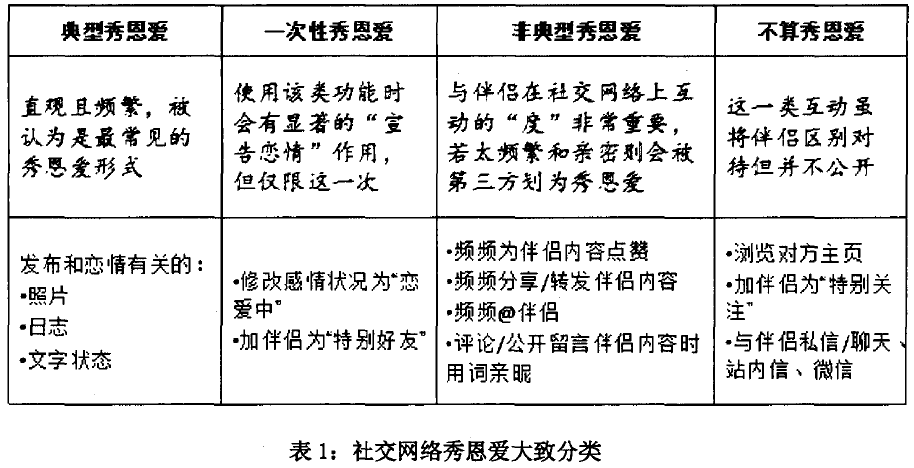为什么嗑CP开心,看别人秀恩爱却不爽?

点击上方蓝字“青年文摘”
右上角“...”点选“设为星标”
添加★标 不再错过推送
每天 8点 12点 20点 不见不散~
作者:硬糖酸梅
来源:果壳(ID:Guokr42)
在某个半夜,我被朋友发的微信震醒,拿起手机一看锁屏界面的最新消息,上面写着:
“你也应该谈个恋爱,感受一下恋爱的快乐。”
我还挺开心的,以为这人终于良心发现要给我介绍对象了,结果等我打开微信往上一拉,发现这人刚脱单,给我发了一堆自己和对象的合照,还感慨了一大堆有的没的。
行吧,我当没看见,把手机往床头一甩,结果越想越气,那天到三点都没睡着。


秀恩爱,真不会分得快
显然,我这是被秀恩爱了,虽然朋友可能并没有意识到自己在“秀”,而只是出于一种情不自禁的表达欲,想要分享一下恋爱的喜悦,但我实在忍不住在心里骂“秀恩爱,分得快”。
秀恩爱在英文中的对应概念是public display of affection,直译是当众亲热,指的是个人在其他人面前展现和情侣感情的现象,时常伴有亲密动作,比如在公共场合亲昵对话、搂搂抱抱乃至接吻等。
不那么直接,但拐着弯表明两人关系很好的行为,也是花式秀恩爱的一种,就像父母们嘴上互相吐槽和抱怨对方,但不经意间又照着对方的喜好准备日常用品,这种默契也能让旁人感觉被秀到了。
随着社交媒体的发展,又出现了社交网络秀恩爱,比如在朋友圈发两人出去玩的牵手照,将头像更换为合照或情侣头像等,有研究者总结了社交网络秀恩爱的多种形式:

多种秀恩爱
无论哪种秀恩爱,对被秀的人来说,心情往往不会太好。烦人、低落、嫉妒、心酸等感情往往混杂在一起,这种广泛的情绪反应使“秀恩爱,分得快”成了隐秘的共识与小小的诅咒。
可会让大家失望的是,“秀恩爱,分得快”更像是旁观者的一厢情愿。几乎没有统计证据支持“秀恩爱真的会分得快”,甚至一些研究会告诉你,秀恩爱会让关系更牢固。
一项研究发现,社交媒体上把头像换成双方合照人的关系满意度更高、与伴侣更亲密,追踪研究则显示,在人们对他们关系感到更满意的日子里,更有可能在网上分享与关系有关的信息。

这不还是秀恩爱吗?烦人!/giphy
另一项针对212位美国大学生的研究则表明,在网上的秀恩爱信息会通过增加双方对关系的承诺感,进而增加两个人六个月后仍然在一起的可能性,这些秀恩爱信息包括将主页的情感状态标记为“恋爱中”、在对方的主页上留言互动、发两人合照等。
如果对方真的燕莺成对、琴瑟相调、过得挺好的话,我们理应为对方感到高兴,但为什么人们普遍对秀恩爱这么反感呢?
要思考秀恩爱为什么那么烦,咱们可以先从那些不烦的秀恩爱开始说起。

承诺大于炫耀的秀恩爱不招人烦
那些放出自己的结婚证、婚礼照、纪念日礼物的朋友圈,反感的人其实不会那么多,大家会很乐意给他们点赞,在评论区发送一大堆“祝福”“恭喜”“太甜了”的评论。
而当一个人秀恩爱的频率过高、秀出来的内容恋爱滤镜太重的时候,大家可能会嫌弃到默默屏蔽对方,这类秀恩爱的极端就是娇妻文学。

二者的区别在于,朋友圈中展示出来的爱究竟是一种健康的、充实的爱,还是一种痴迷的、只是为了炫耀的爱。
斯滕伯格的爱情三角理论认为,完美的爱是由激情、亲密与承诺三部分组成的,当一个人发伴侣合照、发纪念日的小作文时,其实就是做出了一种公开的承诺,这种承诺会让伴侣安心,观众也会有情感上的共鸣。
但这种公开的承诺也可以被视为一种社交展示,跟美食、资产、生活方式一样,“爱”也是一种炫耀的资源,让展示者在相互比较中占据优势地位。
把秀恩爱的内容视作是承诺还是炫耀,看似取决于观众的一念之间,其实也反映了展示者的心态,人当然有炫耀的权利,但观众也是有讨厌的权利的,有时候真不是观众嫉妒心作祟的错。

引发社会比较的秀恩爱才惹人烦
另一种不容易烦人的秀恩爱是嗑CP时CP的秀恩爱。无论是真人CP,还是纸片人CP,只要能发糖,围观者就能开心得在床上扭来扭去。
在CP文化出现前,虚拟作品里的秀恩爱很少被讨伐,就像郭靖和黄蓉,秀恩爱的桥段一抓一大把,但几乎没人讨厌他们。

人们很容易原谅虚拟的秀恩爱,但难以原谅现实生活的秀恩爱,是因为现实生活中的秀恩爱与自己生活的距离太近了,很容易让人产生社会比较。
人们对自己能力、地位等社会特征的判断往往不是根据客观标准,而是通过与周围他人的比较来获得的,这就是社会比较。正如马克思所言:
一座房子不管怎样小,在周围的房屋都是这样小的时候,它是能满足社会对住房的要求的。但是,一旦在这座小房子近旁耸立起一座宫殿,这座小房子就缩成茅舍模样了。
而人们用来比较的对象,往往是与自己相似的人,这种相似包括性别、努力程度、经验、年龄等方面的相似,所以父母辈秀恩爱的杀伤力,就远没有同学秀恩爱的杀伤力大。
在社交媒体上秀恩爱的人,在相似度上与我们是非常高的,很容易被用来当作社会比较的对象,被动接受“秀恩爱”的信息会引起消极的社会比较,认为他们比自己的生活更幸福,引发个体的嫉妒情绪,进而导致主观幸福感的下降。

秀恩爱分得不快,我又被伤害
咋办呢?
“
就当是观察学习
既然没有办法拒绝,那人总不能白吃被秀恩爱的苦,总得拿点好处吧?换个角度,秀恩爱行为其实也可以是情侣合理处理恋爱关系的案例,被秀恩爱是人们对另一种生活状态的观察。
对于优秀的秀恩爱范本,我们可以当作学习资料,好的文案记一记,好的仪式学一学,好的礼物收藏收藏,有对象的下次用上,没对象的更得学了,不然怎么找对象呢?
“
就当是反思机会
被秀恩爱也可以帮助我们提醒自己的情感状态,如果被社会比较的结果刺痛了,那么可以想一想:
是不是别人的关系甜甜蜜蜜,我们的关系不冷不淡?
是不是一直渴望恋爱,自己却迟迟不敢迈出一步?
是不是我把别人想得太完美了,却忽视了日常生活中与那个TA相处的美好瞬间?
当然,也有研究说,情人节的分手率更高,不排除是这些日子里人们被秀恩爱后不断反思自己的结果哈……
“
尝试觉察和接纳自己的情绪……
羡慕、妒忌、恨,都是生而为人正常的情绪体验。
下次它们再出现时,我们可以试着感受觉察一下自己当时的情绪,随后试着去接纳自己的这种感受——这就是情绪调节的接受策略。
接受策略强调以开放、接纳的态度对待情绪和感受,并不试图去改变它们,这个策略能够有效改善人们的情绪状态,降低回避行为及改善人际关系。
身为心理学人的正经话说完了。
我很明白这些说起来容易做起来难,需要在专业人士的支持下做很长时间的练习与感悟,如果马上要到秀恩爱高发期了,比如情人节、520、七夕等,有没有能立即生效的策略啊?
当然有,那就是:
“
关闭朋友圈,卸载微博,闭关一天
不看最省心,躺平最无敌,来,试试看!

图/giphy
参考资料:
[1]张雯宜.(2014).影像传播与亲密关系:社交网络秀恩爱仪式研究(硕士学位论文,复旦大学).
[2]Saslow, L. R., Muise, A., Impett, E. A., & Dubin, M. (2013). Can you see how happy we are? Facebook images and relationship satisfaction. Social Psychological and Personality Science, 4(4), 411-418.
[3]Toma, C. L., & Choi, M. (2015). The Couple Who Facebooks Together, Stays Together: Facebook Self-Presentation and Relationship Longevity Among College-Aged Dating Couples. Cyberpsychology, behavior and social networking, 18(7), 367–372.
[4]蔡育恒.(2017).社交网络背景下的秀恩爱与妒忌关系研究(硕士学位论文,上海交通大学).
[5]郭瑾瑾,牛璐,谢笑春,王鹏程 & 雷雳.(2020).线上“秀恩爱”与旁观者主观幸福感的关系:自尊的中介作用和依恋的调节作用. 心理发展与教育(03),359-366.
[6]江畅 等. 《价值论与伦理学研究(2015年卷)》[M] . 社会科学文献出版社, 2016: 204
[7]邢淑芬,俞国良. (2005). 社会比较研究的现状与发展趋势. 心理科学进展 , 13(1), 78-84.
[8]Morse, K. A., & Neuberg, S. L. (2004). How do holidays influence relationship processes and outcomes? Examining the instigating and catalytic effects of Valentine's Day. Personal Relationships, 11(4), 509-527.
[9]毛继萱.(2021).接受策略对社会排斥情境下消极情绪和攻击性行为的调节(硕士学位论文,西南大学).

作者:硬糖酸梅 编辑:Emeria,odette
本文来自果壳(ID:Guokr42),未经授权不得二次转载,如有需求请联系sns@guokr.com

▽ 点击阅读热门文章 ▽
关注公众号:拾黑(shiheibook)了解更多
[广告]赞助链接:
四季很好,只要有你,文娱排行榜:https://www.yaopaiming.com/
让资讯触达的更精准有趣:https://www.0xu.cn/
 关注网络尖刀微信公众号
关注网络尖刀微信公众号随时掌握互联网精彩
- 1 中法元首相会都江堰 7904367
- 2 中方不接受日方所谓交涉 已当场驳回 7809321
- 3 大闸蟹为何会在欧美泛滥成灾 7714169
- 4 国际机构看中国经济 关键词亮了 7618571
- 5 家长称婴儿被褥印不雅英文单词 7523612
- 6 日方军机滋扰擅闯或被视为训练靶标 7428057
- 7 男子海洋馆内抽烟被白鲸喷水浇灭 7330816
- 8 国乒8比1击败日本队 11战全胜夺冠 7231536
- 9 罪犯被判死缓破口大骂被害人一家 7142947
- 10 千吨级“巨无霸”就位 7041054










 青年文摘
青年文摘







